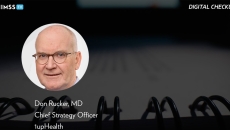Operations
Hospitalizations for COVID-19 have increased 20% since mid-November, according to the CDC.
AI innovation at the Cleveland Clinic is in its early days, but there are a number of initiatives focused on the pathology and lab areas and supporting physicians to optimize their workflows, says Chief Analytics Officer Albert Marinez.
Two of company's MA plans earned 5 stars in 2024, during a difficult year to rank highly in the Medicare Advantage star ratings.
The Houston-based health system for children and women is a HIMSS Davies Award of Excellence winner.
Putting policy and procedures into place is one of the best ways to navigate compliance in the novel area between healthcare and technology, says Sara Helene Shanti, a partner in Sheppard Mullin's Corporate Practice Group in Chicago.
Hospitalization rates are higher due to RSV as compared to Omicron in all age groups, though Omicron and flu show similar numbers.
Liberty Hospital is still determining the nature and extent of the incident, and is conducting an investigation, officials say.
AI can make healthcare more human by alleviating much of the burden, says Jay Rughani, investment partner at a16z, who, with colleagues recently released, "AI: The Teammate Clinicians Need."
The Trusted Exchange Framework and Common Agreement is now live, but the challenge is FHIR in TEFCA, says Don Rucker, chief strategy officer for 1upHealth and former national coordinator for Health IT at HHS.
Lifestyle is a bigger factor in how long we live than science, innovation and curative therapies, says Andy Davis of Deloitte.









